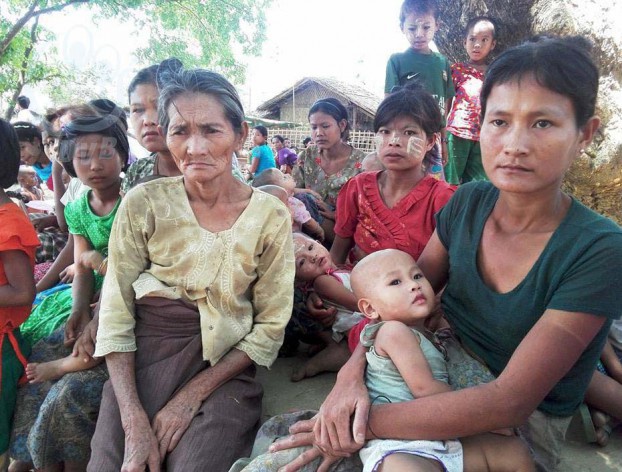As fighting between government troops and the rebel Arakan Army adds to the number of internally displaced persons (IDPs) in Arakan, local and international are mobilizing to deal with the latest humanitarian crisis in the strife-torn state.
With no sign of hostilities ceasing in the near future, aid groups are warning that the increasing number of IDPs may soon stretch the region’s humanitarian resources to the breaking point.
According to a statement from the International Committee of the Red Cross (ICRC) released on 3 May, “Armed clashes took place in mid-April in the mountain ranges of Kyauktaw and Ponnagyun townships, which prompted over 1,000 people to flee to safer areas in Rathedaung, Buthidaung and Kyauktaw townships.”
Those displaced are mostly staying in the homes of relatives, or on the floors of local schools and monasteries. While the local communities are taking the lead in providing services for the displaces, the ICRC is distributing items such as blanks, cooking pots, and mosquito nets.
“People left their homes with the bare minimum. Living conditions are particularly difficult and the schools crowded. People are sleeping directly on the floor or on sheets of tarpaulin,” said Wai Cheong Yip, head of the ICRC in Maungdaw.
Already, the communities have shown signs of strain as they try to accommodate the IDPs. “Water could soon become a concern if the situation persists as it is putting pressure on the host communities who already face a limited availability,” said Aleinor Bernhard of ICRC’s Sittwe office.
Even before the fighting broke out last year, the population of northern Arakan State suffered from a lack of resources and development. In addition to the Arakanese Buddhist communities that have had their lives upturned by the fighting, the Rohingya Muslims living in the area are largely denied the freedom to leave their home villages, drastically limiting their access to livelihoods and basic living amenities.
“In some areas of the northern parts of Rakhine [Arakan] State, rates of severe acute malnutrition in children under five are above 15 percent, which is the emergency level,” said Pierre Peron, an information officer with the UN Office for the Coordination of Humanitarian Affairs.
[related]
Renewed fighting between the two sides broke out in late 2015 and has continued sporadically since then. The Arakan Army was one of several armies excluded from negotiations for last year’s National Ceasefire Agreement that is currently fighting the Burmese army.
A motion to end the fighting in Arakan was submitted to parliament earlier this week, and quickly met with opposition from military-appointed MPs. According to state media, during debates on the floor of parliament, the military appointees say inviting the Arakan Army to join the national ceasefire dialogue would not be possible if they continued to attack Burmese army positions in the state.



